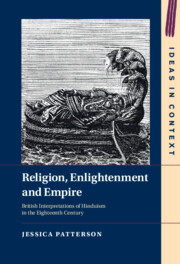Book contents
- Religion, Enlightenment and Empire
- Ideas in Context
- Religion, Enlightenment and Empire
- Copyright page
- Dedication
- Contents
- Acknowledgements
- A Note on the Text
- Abbreviations
- Introduction
- Part I Religion, Enlightenment and Empire
- Part II From Scepticism to Orientalism
- Chapter 5 Nathaniel Brassey Halhed and Gentoo Antiquity
- Chapter 6 Charles Wilkins and the Gēētā
- Chapter 7 William Jones, Vedānta and the ‘Permanent Settlement’
- Conclusion
- Bibliography
- Index
Chapter 6 - Charles Wilkins and the Gēētā
from Part II - From Scepticism to Orientalism
Published online by Cambridge University Press: 09 December 2021
- Religion, Enlightenment and Empire
- Ideas in Context
- Religion, Enlightenment and Empire
- Copyright page
- Dedication
- Contents
- Acknowledgements
- A Note on the Text
- Abbreviations
- Introduction
- Part I Religion, Enlightenment and Empire
- Part II From Scepticism to Orientalism
- Chapter 5 Nathaniel Brassey Halhed and Gentoo Antiquity
- Chapter 6 Charles Wilkins and the Gēētā
- Chapter 7 William Jones, Vedānta and the ‘Permanent Settlement’
- Conclusion
- Bibliography
- Index
Summary
Chapter 6 situates Charles Wilkins’ approach to his translation of the Bhagavad-Gītā in the long history of British interpretations of Hinduism charted throughout this book. It argues that his ‘philosophical’ interpretation of the Hindoo religion was orientated to the same Enlightenment culture of religious debate that shaped the earlier work of Holwell and Dow, while at the same time contributing to the politics of his patron, Governor General Warren Hastings.
- Type
- Chapter
- Information
- Religion, Enlightenment and EmpireBritish Interpretations of Hinduism in the Eighteenth Century, pp. 239 - 262Publisher: Cambridge University PressPrint publication year: 2021

